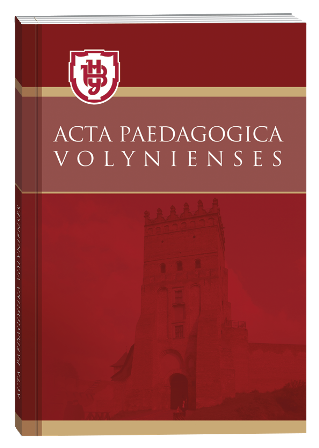CROSS-CULTURAL COMPETENCE THROUGH THE PRISM OF PROFESSIONAL TRAINING OF FUTURE SPECIALISTS IN NON-PHILOLOGICAL SPECIALITIES
DOI:
https://doi.org/10.32782/apv/2024.3.8Keywords:
cross-cultural competence, cross-cultural communication, future specialist, criteria of cross-cultural competence, components of cross-cultural competenceAbstract
The paper deals with the clarifying of the content of the concept of «cross-cultural competence»; the main components of cross-cultural competence through the prism of professional training of future specialists in non-philological specialities are analysed in it. The works of Ukrainian scholars on the study of cross-cultural competence are reviewed. Communicative competence is defined as the ability of a higher education student to effectively solve problems in the context of intercultural communication, which involves mutual understanding of the parties and constructive dialogue. It is emphasised that the main elements of cross-cultural competence are knowledge (necessary information for effective interaction); skills (necessary behavioural skills for effective interaction); motivation; empathy. The components of cross-cultural competence such as knowledge, skills, motivation and commitment are considered in the paper. The process of forming cross-cultural competence is a specially organised interaction between a teacher and a student aimed at solving certain tasks, in particular the ability to identify and analyse a multicultural educational environment, present one’s own culture, and develop a culture of interethnic communication. It is noted that a future specialist should speak not only his/her native language, but also several foreign languages, competently build oral and written speech, apply oratorical methods and techniques, have effective communication strategies and tactics, be able to analyse the necessary information and critically comprehend it. During their studies, future specialists should have language knowledge, skills in using language clichés in accordance with communication situations, be able to interpret the interlocutor’s behaviour, have relevant knowledge of the history and culture of the people, etc. It is also worth considering both the linguistic component of cross-cultural competence and the ability to use the acquired knowledge in different communication situations, the ability to understand the behaviour and thinking of a foreigner. The prospect of further research could be the study of linguistic socialisation of the individual and the identification of levels of cross-cultural competence of higher education students.
References
Атрощенко Т. О., Качур Б. М., Качур М. М. Формування кроскультурної компетентності майбутніх керівників закладів освіти. Вісник Черкаського національного університету імені Богдана Хмельницького. Серія: «Педагогічні науки». 2018. № 3. С. 7−12.
Баніт О. Кроскультурна компетентність сучасного топ-менеджера міжнародної компанії. Edukacja Zawodowa i Ustawiczna . 2019. № 4. С. 173−181.
Білецька О. О. Міжкультурна компетентність фахівців у галузі міжнародних відносин як складова професійної діяльності. Питання культурології. 2017. № 33. С. 86–95.
Дудка Т. Ю. Структуротворчий характер кроскультурної компетентності крізь призму професійної підготовки викладачів вищої школи. Актуальні проблеми вищої професійної освіти. Київ, 2021. С. 26−27.
Іванов О., Іванова В. Кроскультурна комунікація в контексті мистецької діяльності. Науковий вісник МДУ імені В. О. Сухомлинського. Серія: Педагогічні науки. 2020. Вип. № 1 (68). С. 90−95.
Лашкіна М., Христокін Г., Васильченко В. Кроскультурні комунікації в цифрову епоху: актуальність в журналістській діяльності. Образ. 2023. Вип. 2 (42). С. 86−96.
Пальчикова О. О. Кроскультурна компетентність у навчанні української мови як іноземної. Філологічні студії: Науковий вісник Криворізького державного педагогічного університету. 2012. № 8. С. 319–326.
Сукаленко Т. Кроскультурна компетентність здобувача вищої освіти спеціальності «журналістика»: практичний аспект. Acta Paedagogica Volynienses. 2023. № 3. С. 71–77.
Чабак Л. Іншомовна кроскультурна компетентність як складова професійної компетентності здобувачів вищої економічної освіти. Фінансовий простір. 2019. № 1. С. 156−163.
Щетініна Л. В., Рудакова C. Г. Сутність кроскультурної компетентності: від теорії до практики. URL: http://www.economy.nayka.com.ua/?op=1&z=5537 (дата звернення: 06.05.2024).







